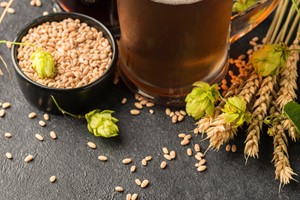Researchers at Nanyang Technological University, Singapore (NTU Singapore), have made significant strides in tackling food waste and enhancing sustainability by developing a pioneering method to extract valuable protein from brewers' spent grain (BSG). This breakthrough, spearheaded by the university's Food Science and Technology program, promises to revolutionize the treatment of BSG, a major byproduct of the beer brewing industry.
BSG, the solid residue remaining after malted barley is used in beer production, constitutes a substantial portion of the brewing process's total waste, comprising up to 85%. Despite its abundance, BSG is typically discarded, contributing to environmental strain and greenhouse gas emissions when sent to landfills. However, the innovative protein extraction method devised by NTU researchers presents a sustainable alternative, potentially mitigating these adverse effects.
The research, recently published in the journal Innovative Food Science and Emerging Technologies, outlines the methodology employed by NTU scientists to extract protein from BSG. Through a meticulous process involving sterilization and fermentation using Rhizopus oligosporus, a food-grade fungus, the complex structure of BSG is broken down over a three-day period. This breakdown renders the protein content more accessible for extraction.
Following fermentation, the BSG undergoes drying, grinding into a powder, sieving, and centrifugation to separate the extracted protein from the rest of the mixture. The resultant protein, rich in antioxidants, showcases immense potential for various applications, including dietary supplements and enriching plant-based foods. Moreover, the protein's antioxidant properties could extend its utility to the cosmetics industry, offering an eco-friendly alternative to conventional components.
Professor William Chen, Director of NTU's Food Science and Technology program and senior author of the study, emphasized the significance of this innovation in addressing global challenges related to food wastage and protein scarcity. He highlighted the transformative potential of repurposing BSG into a valuable protein source, symbolizing sustainability and ingenuity in resource management.
Dr. Chai Kong Fei, first author of the study and Senior Research Fellow at NTU's Food Science and Technology program, underscored the versatility of the extracted protein, noting its suitability for both dietary and cosmetic applications. Dr. Chai emphasized the natural exfoliating properties and antioxidant abundance of the BSG protein, suggesting its potential incorporation into skincare formulations.
The research findings have garnered positive responses from industry partners, reflecting the potential economic and environmental benefits of this innovation. Mirte Gosker, Managing Director of The Good Food Institute Asia Pacific, praised the innovative approach to utilizing underutilized grains, foreseeing opportunities for local producers and entrepreneurs in crafting nutrient-dense plant-based products.
NTU's commitment to addressing environmental impact aligns with its strategic vision outlined in the NTU 2025 plan, emphasizing sustainability as one of humanity's grand challenges. Through groundbreaking research initiatives like the protein extraction from BSG, NTU continues to lead in advancing sustainable food technologies and contributing to global efforts in waste reduction and resource optimization.
Nanyang Technological University











